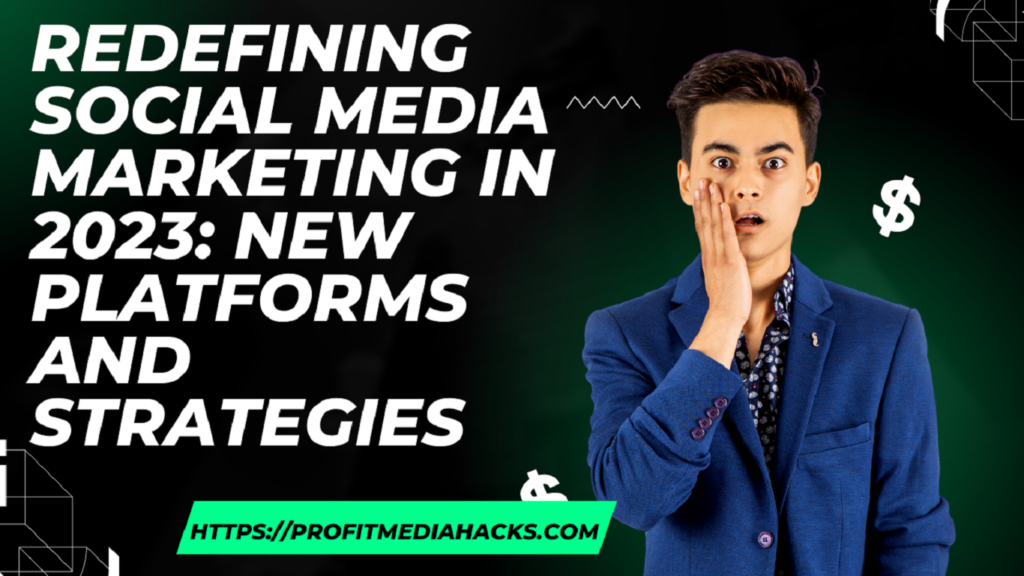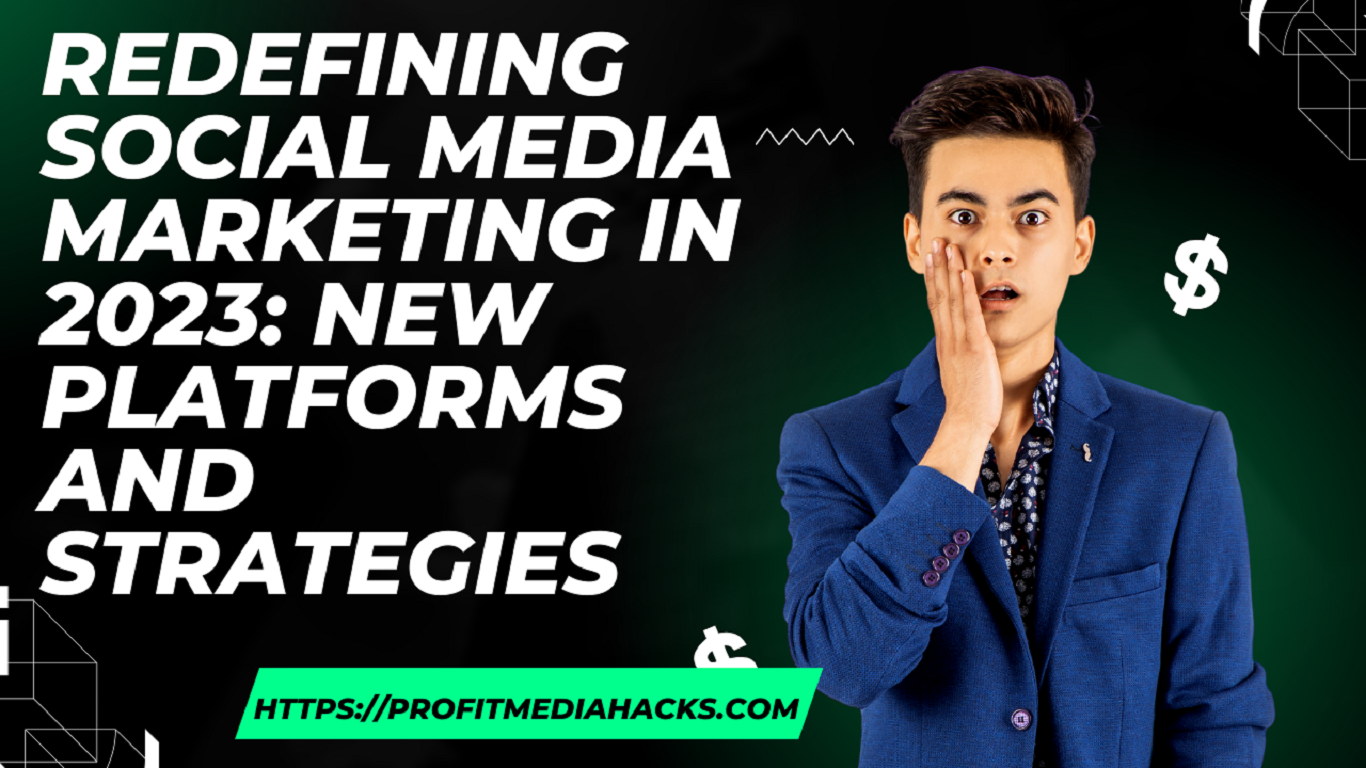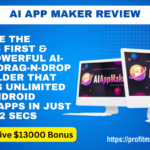Social media marketing has transformed the way businesses engage with their audiences, and as we step into 2023, the landscape is evolving even further. New platforms and strategies are reshaping the way brands interact with their customers, creating exciting opportunities for businesses to stand out and connect with their target market. In this article, we’ll explore five key points that showcase the redefined landscape of social media marketing in 2023.
Easiest & Proven Way to Make $100 Daily with 0 COST – Watch THIS FREE Training to START >>

1. The Emergence of Niche Social Platforms:
With the ever-expanding diversity of user interests, niche social platforms will gain significant traction in 2023. Brands are leveraging these platforms to target specific demographics and create more tailored marketing campaigns, fostering deeper connections with their audiences.
2. Integration of Augmented Reality (AR) and Virtual Reality (VR):
Social media platforms are increasingly integrating AR and VR technologies to provide immersive and interactive experiences for users. Businesses are utilising these technologies to showcase products and services in more engaging ways, leading to higher customer engagement and conversion rates.
3. The Dominance of Video Content:
Video content continues to dominate the social media landscape in 2023, with platforms emphasising video-based features. Brands are leveraging short-form videos, live streaming, and interactive video content to capture audience attention and convey messages more effectively, leading to increased brand visibility and engagement.
4. Rise of Social Commerce:
Social media platforms have become key hubs for e-commerce activities, blurring the lines between social networking and online shopping. Businesses are adopting social commerce strategies, such as shoppable posts and integrated payment gateways, to streamline the customer journey and drive direct sales through social media platforms.
5. AI-Powered Personalisation:
AI-driven personalisation is revolutionising social media marketing in 2023, enabling brands to deliver highly targeted and relevant content to their audiences. With advanced algorithms, businesses can analyse user behaviour and preferences to deliver personalised recommendations and advertisements, enhancing customer experiences and fostering long-term brand loyalty.
The Emergence of Niche Social Platforms:
In the dynamic realm of social media marketing, 2023 has seen a notable shift towards the emergence of niche social platforms. These specialized networks are gaining traction, offering a more targeted approach for businesses to engage with their audiences. Understanding the significance of these platforms is crucial for marketers aiming to optimize their strategies for the year ahead.
Hyper-Targeted Community Building: Niche social platforms allow businesses to foster communities centered around specific interests, enabling them to connect with a highly engaged and targeted audience.
Enhanced Personalization Opportunities: With the intimate nature of niche platforms, marketers can tailor their content and messaging to align precisely with the preferences and needs of their niche audience, fostering deeper and more meaningful connections.
Amplified Brand Relevance: Engaging with a niche audience on specialized platforms helps brands establish a more relevant and authentic presence, positioning themselves as authorities within their specific industry or interest area.
In-depth Data Insights: Niche platforms often provide more detailed data insights, allowing marketers to gain a comprehensive understanding of their target audience’s behavior, preferences, and pain points, thereby informing more effective and targeted marketing strategies.
Cultivation of Micro-Influencer Partnerships: The rise of niche platforms facilitates the cultivation of relationships with micro-influencers who have a dedicated following within specific interest communities, enabling brands to leverage their influence to reach highly relevant audiences effectively.
Integration of Augmented Reality (AR) and Virtual Reality (VR):
As we delve deeper into 2023, the integration of Augmented Reality (AR) and Virtual Reality (VR) is rapidly reshaping the landscape of digital marketing. The seamless blending of these immersive technologies is opening up a myriad of innovative opportunities for brands to engage and captivate their audiences in unprecedented ways. Understanding the implications of this integration is paramount for marketers aiming to stay ahead in the competitive digital sphere.
Enhanced Experiential Marketing: The integration of AR and VR enables brands to create immersive and interactive experiences that bridge the gap between the physical and digital worlds, allowing consumers to engage with products and services in a more experiential and memorable manner.
Personalized Product Trials and Demonstrations: With AR and VR, consumers can virtually experience products before making a purchase, facilitating personalized and convenient product trials and demonstrations that enhance the overall shopping experience.
Easiest & Proven Way to Make $100 Daily with 0 COST – Watch THIS FREE Training to START >>
Interactive Brand Storytelling: Marketers can leverage AR and VR to craft captivating narratives that unfold in interactive and engaging ways, allowing consumers to become active participants in the brand’s story, thus fostering deeper emotional connections and brand loyalty.
Virtual Try-Ons and Fittings: Integrating AR and VR into e-commerce platforms enables customers to virtually try on products such as clothing, accessories, and even home decor, providing them with a realistic and personalized shopping experience that boosts confidence in their purchase decisions.
Immersive Event and Brand Activations: AR and VR can be harnessed to create immersive event experiences and brand activations, allowing brands to engage with audiences in virtual environments, irrespective of geographical constraints, thereby amplifying the reach and impact of their marketing initiatives.
The Dominance of Video Content:
In the ever-evolving landscape of digital marketing, the dominance of video content continues to be a defining trend in 2023. With the ever-increasing consumption of online video, businesses are leveraging this medium to deliver compelling and immersive experiences to their target audiences. Recognizing the significance of video content is crucial for marketers seeking to establish a robust and engaging online presence in the current digital climate.
Engaging Storytelling Medium: Video content serves as a powerful storytelling medium, allowing brands to convey their narratives in a visually compelling and emotionally resonant manner that captivates and retains the audience’s attention.
Versatile Content Formats: From product demonstrations and tutorials to behind-the-scenes glimpses and brand storytelling, video content offers diverse formats that cater to various marketing objectives, enabling brands to communicate their messages effectively across different platforms and channels.
Enhanced Audience Engagement: The dynamic and interactive nature of video content fosters higher levels of audience engagement, encouraging increased likes, shares, and comments, thereby facilitating meaningful conversations and fostering a sense of community around the brand.
Search Engine Optimization (SEO) Benefits: Integrating video content into marketing strategies enhances SEO efforts, as videos are favored by search engine algorithms, leading to improved search rankings and increased visibility for brands within search results.
Mobile-Optimized Accessibility: With the growing dominance of mobile devices, video content allows brands to reach and engage with audiences on the go, providing easily digestible and accessible content that caters to the preferences of today’s mobile-centric consumers.
Rise of Social Commerce:
As digital marketing continues to evolve, the rise of social commerce stands out as a pivotal trend reshaping the way businesses engage with their customers in 2023. The convergence of social media and e-commerce has paved the way for a seamless shopping experience, revolutionizing the way consumers discover and purchase products online. Understanding the implications of this transformative shift is vital for marketers seeking to harness the power of social platforms to drive sales and foster brand loyalty.
Seamless Integration of Shopping and Socializing: Social commerce seamlessly integrates the shopping experience into social media platforms, allowing consumers to discover, explore, and purchase products without leaving the app, thus blurring the lines between social interaction and online shopping.
Easiest & Proven Way to Make $100 Daily with 0 COST – Watch THIS FREE Training to START >>
Influencer-Driven Purchase Decisions: The rise of social commerce has amplified the influence of social media influencers, as consumers increasingly rely on their recommendations and reviews when making purchasing decisions, thereby underscoring the importance of strategic influencer partnerships for brands.
Shoppable Posts and Stories: Brands leverage social commerce by creating shoppable posts and stories, enabling consumers to make purchases directly from the content they engage with, fostering a frictionless and convenient shopping experience that boosts conversion rates.
Enhanced User-Generated Content (UGC) Engagement: Social commerce encourages user-generated content creation, as consumers share their experiences with products, effectively acting as brand advocates, which in turn fosters a sense of community and authenticity around the brand.
Data-Driven Personalization: The integration of social commerce generates valuable consumer data that can be leveraged to personalize marketing strategies, allowing brands to deliver targeted and relevant product recommendations and promotions based on consumer preferences and behavior, thereby enhancing the overall shopping experience.
AI-Powered Personalisation:
In the rapidly evolving landscape of digital marketing, the integration of AI-powered personalization is emerging as a game-changer in 2023. By harnessing the capabilities of artificial intelligence, businesses can now deliver highly tailored and individualized experiences to their customers, thereby fostering deeper connections and enhancing overall engagement. Understanding the profound impact of AI-powered personalization is essential for marketers aiming to craft targeted strategies that resonate with their audience on a more intimate level.
Dynamic Customer Segmentation: AI-powered personalization enables businesses to dynamically segment their customer base, allowing for the creation of highly specific and targeted audience groups based on individual preferences, behavior, and purchase history.
Real-Time Content Customization: Leveraging AI, marketers can customize content in real time, delivering personalized product recommendations, offers, and messaging that align with the unique preferences and needs of each customer, thereby fostering a more meaningful and relevant brand-consumer relationship.
Predictive Behavioral Analysis: AI-driven algorithms can analyze consumer behavior patterns and predict future actions, enabling businesses to anticipate customer needs and proactively tailor their offerings and marketing strategies to meet those needs effectively, thereby enhancing customer satisfaction and loyalty.
Automated Email Marketing Personalization: AI-powered personalization streamlines and automates the process of email marketing personalization, enabling businesses to deliver targeted and relevant content to subscribers, fostering higher open rates, click-through rates, and overall engagement with email campaigns.
Enhanced Customer Experience Across Channels: Integrating AI-powered personalization across various marketing channels ensures a consistent and seamless customer experience, as individuals receive personalized interactions and recommendations regardless of the platform or touchpoint, thereby fostering a cohesive and holistic brand experience.
Conclusion
The year 2023 marks a pivotal moment in the evolution of social media marketing, characterized by the emergence of new platforms and innovative strategies. Businesses that adapt to these changes and leverage the power of niche platforms, AR/VR technologies, video content, social commerce, and AI-driven personalisation are poised to gain a competitive edge in the dynamic digital landscape. By embracing these trends, brands can create more meaningful connections with their target audiences, drive engagement, and ultimately achieve their marketing objectives in the rapidly evolving social media sphere.
Easiest & Proven Way to Make $100 Daily with 0 COST – Watch THIS FREE Training to START >>
Thank you so much for taking the time to read my article, ”Redefining Social Media Marketing in 2023: New Platforms and Strategies” Stay Safe!!!!













